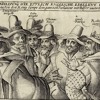Basic Info
Artist
Genre
Created
Plays
Albert Wollmer
Electronic
9 years ago
1,455
Description
The title and text of this piece are derived wholly from promotional copy provided by CBS to promote their television program "The Big Bang Theory," a program that the composer admittedly does not watch. The copy was in the form of clickbait, the pesky internet liter that promises to educate the reader about such items of cultural import such as "34 Disfigured Child Stars - Look at them now!" and "Hollywood's Greatest Mormons." In this case, the CBS promotional department was extolling the charm and virtues of one of their stars, an attractive petite blonde actress, Melissa Rauch. Ms. Rauch apparently has 21 very important things that are imperative for us to learn about her.
Instead of the general hyperbole that the average media consumer might have expected to encounter the composer was greeted by a character study that more than exceeded effusiveness resembling the obsessive rantings of a paranoiac. A succinct list of reasons to gush over Ms. Rauch, it was a litany of comments ranging from the admiring ("everyone is envious of her style"), the beatific ("she is a vision in yellow"), and the ontologically neurotic ("she's really real"). The tone was not as much as the voyeuristic celebration that American advertisement is well known for, but rather one of grotesque pathology and secular rapture. It is not apparent if it were the intention of the copywriter to describe Ms. Rauch's virtues in a manner reminiscent of a parody of bad love poetry, or if he were a stalker furiously longing in an unfinished basement wallpapered with pictures of the actress. Reading this PR hagiography, the composer was reminded of Mimaroglu's "Threnody for Sharon Tate" where reciters creepily intone such testimony about Ms. Tate's murderer such as "He is the son of man, he is the son of God, he is the evidence of God, he is the victim of God ... He made me feel I can play a guitar, he made me feel like I could hold a knife" over a cheery antiphon of "Kill, kill, kill." The good people at CBS provide a somewhat more banal text, but it can be read just as disturbingly.
Benjamin explains that for the production of popular art, "what matters primarily is that the actor represents himself to the public before the camera, rather than representing someone else. " This is the apotheosis of the celebrity that our culture revels so much in. A favorite star is not a mere folk hero, but deifide like Caesar's corpse upon his public pyre. While a celebrity can be in its basic form a symbolic persona in which the many values, virtues, vices, and excesses of a society are tightly packed in, at its very worst the worship of these people underscores the tyrrany of economic and cultural oligarchy.
To paraphrase Luciano Berio in his notes for Visages, this piece is intended as a tribute to the internet as the most widely used means of spreading useless words.
Albert Wollmer,
Spring, 2015
This recording is a stereo reduction of what was originally a quadraphonic recording.
You May Also Like











